-
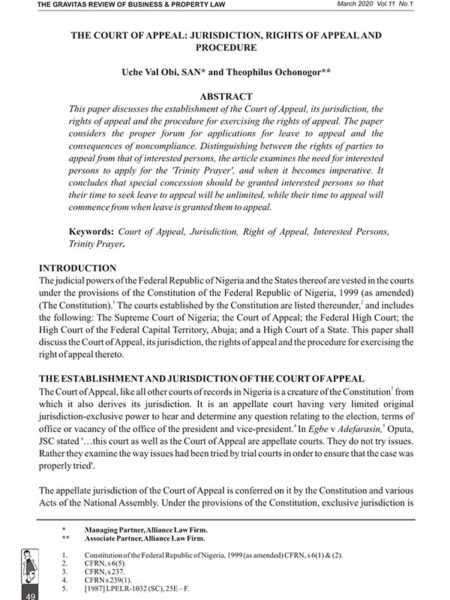
The Court of Appeal: Jurisdiction, Rights of Appeal and Procedure
0₦2,500.00Uche Val Obi, SAN and Theophilus Ochonogor of the Alliance Law Firm in their article, The Court of Appeal: Jurisdiction, Rights of Appeal and Procedure, examine the jurisdiction, rights of appeal and procedure of the Court of Appeal. They consider intriguing issues including appeals by interested persons, whether there is a time limit within which an applicant may seek leave to appeal as an interested party, whether an interested party is exempted from seeking the ‘trinity prayers’ and whether an applicant seeking to appeal as an interested party is to approach the trial high court or the Court of Appeal in the first instance.
-
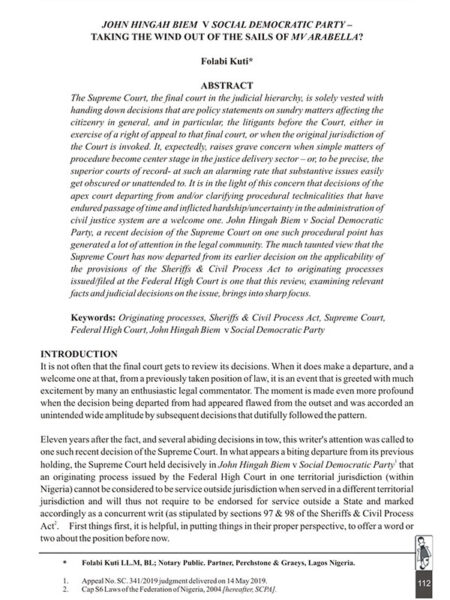
John Hingah Biem v Social Democratic Party – Taking the Wind Out of the Sails of MV Arabella?
0₦2,500.00Folabi Kuti, Partner, Perchstone & Graeys Lagos Nigeria in John Hingah Biem v Social Democratic Party – Taking the winds out of the sails of Arabella? analyses the recent decision of the Supreme Court in John Biem. He considers whether the apex court has indeed departed from its earlier decision in MV Arabella on the applicability of the provisions of the Sheriffs & Civil Process Act to originating processes issued/filed at the Federal High Court.
-
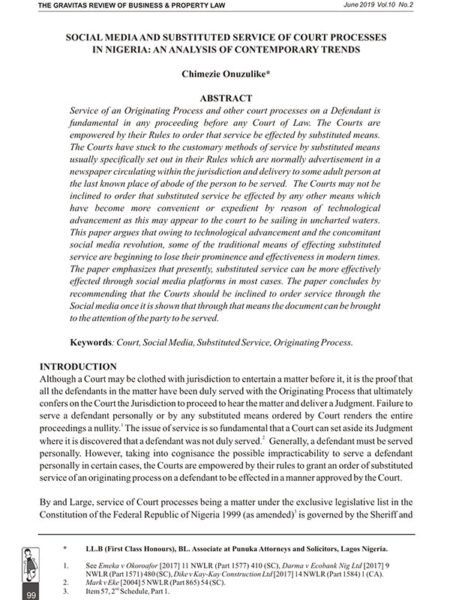
Social Media and Substituted Service of Court Processes in Nigeria: An Analysis of Contemporary Trends
0₦2,500.00Chimezie Onuzulike, Associate at Punuka Attorneys and Solicitors, Lagos Nigeria in his article, Social Media and Substituted Service of Court Processes in Nigeria: An Analysis of Contemporary Trends, peruses various High Court Rules and posits that despite the courts sticking to the customary methods of service by substituted means, normally advertisement in a newspaper circulating within the jurisdiction or delivery to some adult person at the last known place of abode of the person to be served, there may be room for substituted service through the social media. He argues that owing to technological advancement and the concomitant social media revolution, substituted service can be more effectively effected through social media platforms. He concludes that though a Nigerian court has blazed the trail, should be inclined to order service through the social media once it is shown that through that means the document can be brought to the attention of the party to be served.
-
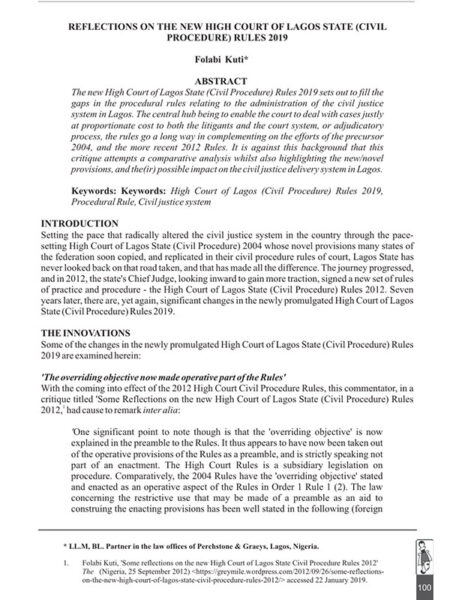
Reflections on the New High Court of Lagos State (Civil Procedure) Rules 2019
0₦2,500.00Folabi Kuti, Partner, Perchstone & Graeys Lagos Nigeria in Reflections on the New High Court of Lagos State (Civil Procedure) Rules 2019, undertakes a comparative analysis of the Civil Procedure Rules of 2012 and 2019, highlighting the novel changes in the new Rules and the likely impact on the civil justice delivery system in Lagos State.
-
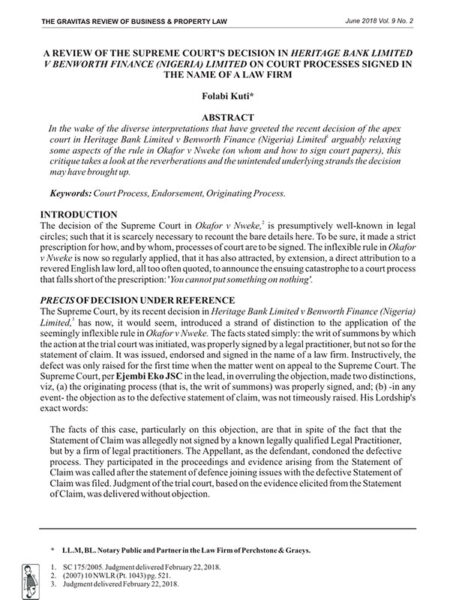
A Review of the Supreme Court’s Decision in Heritage Bank Limited v Benworth Finance (Nig) Ltd on Court Processes Signed in the Name of a Law Firm
0₦2,500.00Folabi Kuti, Partner Perchstone & Graeys, in A Review of The Supreme Court’s Decision in Heritage Bank Limited v Benworth Finance (Nigeria) Limited On Court Processes Signed in the Name of a Law Firm, contemplates the diverse interpretations that have greeted the recent decision of the apex court in the cited case arguably relaxing some aspects of the rule in Okafor v Nweke. Folabi takes a critical look at the reverberations and the unintended underlying strands the decision may have brought up.
-
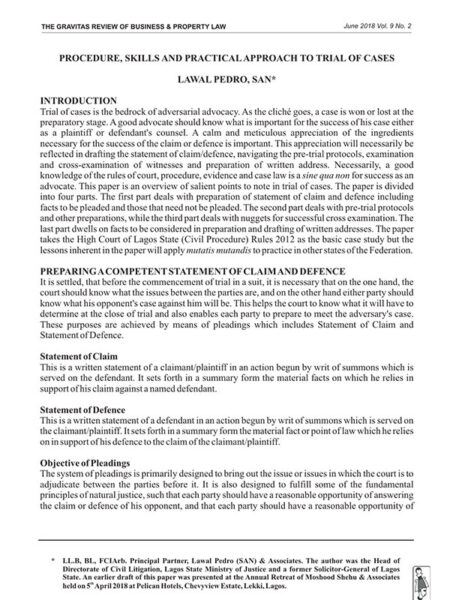
Procedure, Skills and Practical Approach to Trial of Cases
0₦2,500.00Lawal Pedro SAN, Principal Partner, Lawal Pedro (SAN) & Associates and former Solicitor-General of Lagos State in his article, Procedure, Skills and Practical Approach to Trial of Cases, notes that a good knowledge of the rules of court, procedure, evidence and case law is a sine qua non in trial of cases which is the bedrock of adversarial advocacy. Using case law as the framework and the High Court of Lagos State (Civil Procedure) Rules 2012 as the basic case study, he points out important elements in preparation of statement of claim/defence and pre-trial protocols. He gives nuggets for successful cross examination, and facts to consider in drafting good written addresses.
-
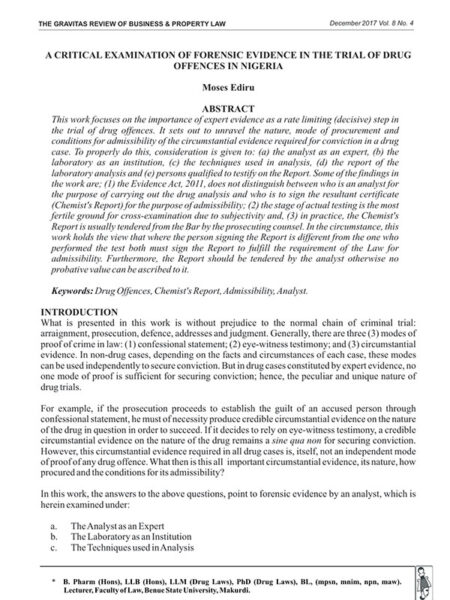
A Critical Examination of Forensic Evidence in the Trial of Drug Offences in Nigeria
0₦2,500.00Dr. Moses Ediru of the Benue State University, Makurdi, in his article, “A Critical Examination of Forensic Evidence in the Trial of Drug Offences in Nigeria”, unravels the nature , mode of procurement, and conditions for admissibility of circumstantial evidence required for conviction in a drug case. He considers salient evidential issues that should engage the attention of counsel in trial of drug offences including the role of the analyst as an expert, the laboratory as an institution, the techniques used in analysis, the report of the laboratory analysis, and persons qualified to testify on the Report.
-
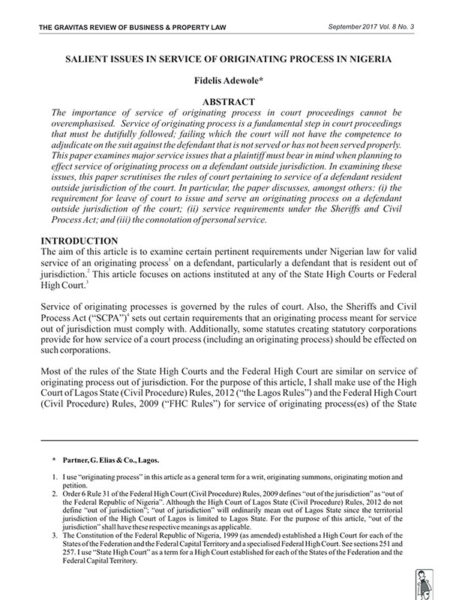
Salient Issues in Service of Originating Process in Nigeria
0₦2,500.00Fidelis Oyewole, Partner, G. Elias & Co in his article, “Salient Issues in Service of Originating Process in Nigeria” explores the world of service of originating processes with a compendium of rules and rulings, to help the practitioner navigate the somewhat arcane terrain of service. In particular, he scrutinises the rules of court pertaining to service of a defendant resident outside jurisdiction, the requirement for leave of court to issue and serve a defendant outside jurisdiction, service requirements under the Sheriffs and Civil Process Act, and the connotation of personal service.
-
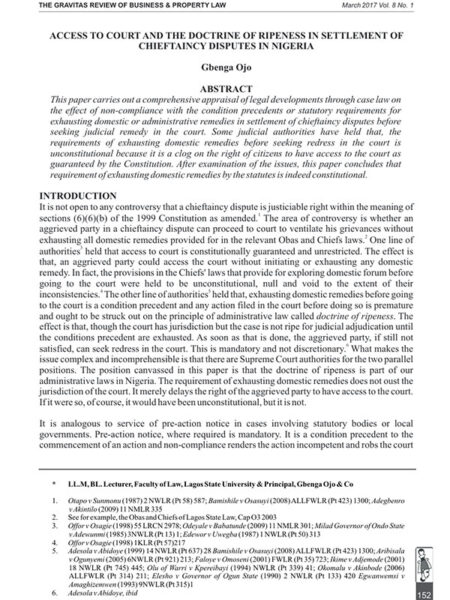
Access to Court and the Doctrine of Ripeness in Settlement of Chieftaincy Disputes in Nigeria
0₦2,500.00Gbenga Ojo, Lecturer, Lagos State University and Principal, Gbenga Ojo & Co in his article “Access to Court and the Doctrine of Ripeness in Settlement of Chieftaincy Disputes in Nigeria” undertakes a comprehensive appraisal, through case law, of the effect of non-compliance with the conditions precedent or statutory requirements for exhausting administrative remedies in settlement of chieftaincy disputes before seeking judicial remedy.
-
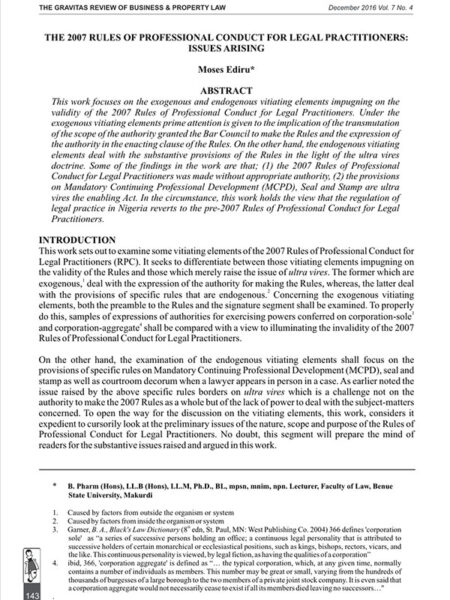
The 2007 Rules of Professional Conduct for Legal Practitioners: Issues Arising
0₦2,500.00Dr. Moses Ediru of the Faculty of Law, Benue State University, Makurdi in his compelling piece “The 2007 Rules of Professional Conduct for Legal Practitioners: Issues Arising” gives exogenous and endogenous vitiating elements impugning the validity of the 2007 Rules of Professional Conduct for Legal Practitoners (RPC). He argues that the 2007 RPC was made without appropriate authority, the provisions on Mandatory Continuing Professional Development (MCPD), Seal and Stamp are ultra vires the Legal Practitioners Act and the decision of the Supreme Court in Gen. Sarkin Yaki v Senator Abubakar Bagudu on the Seal and Stamp, was reached per incuriam.
-
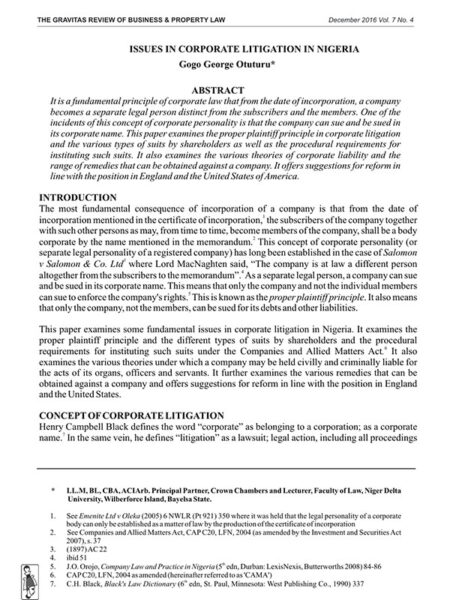
Issues in Corporate Litigation in Nigeria
0₦2,500.00Gogo Otuturu of the Faculty of Law, Niger Delta University, Wilberforce Island, Bayelsa State in his article “Issues in Corporate Litigation in Nigeria” examines a myriad of issues in corporate litigation including theories of corporate liability, the proper plaintiff principle, personal, representative and derivative actions by shareholders, pre-action notice and limitation period.
-
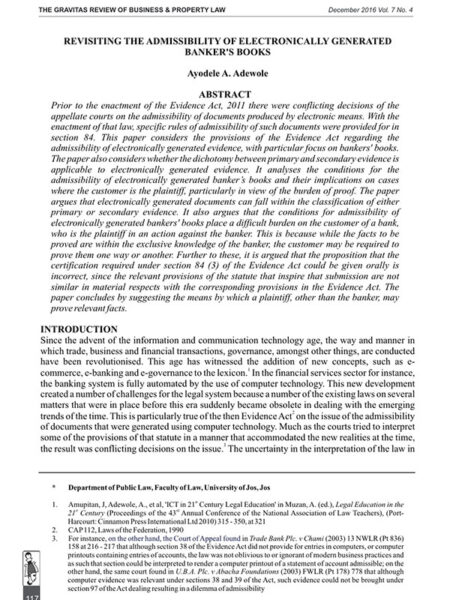
Revisiting the Admissibility of Electronically Generated Banker’s Books
0₦2,500.00Ayodele Adewole of the Department of Public Law, University of Jos in his rivetting article “Revisiting the Admissibility of Electronically Generated Bankers’ Books” analyses the provision of the Evidence Act, 2011 as it relates to the admissibility of electronically generated documents, especially bankers’ books. He considers whether the dichotomy between primary and secondary evidence is applicable to electronically generated evidence. He argues that the requirement for certification under section 84 places a difficult burden on the customer of a bank, who is the plaintiff in an action against the banker and has to prove a fact within the exclusive knowledge to the banker, who generates, stores and has custody of the record. In such a case, the interests of the party seeking to prove, and that of the party against who the document is sought to be proved is not coterminous, thereby resulting in frustration for the party seeking to prove the fact.
The Gravitas Review of Business & Property Law



